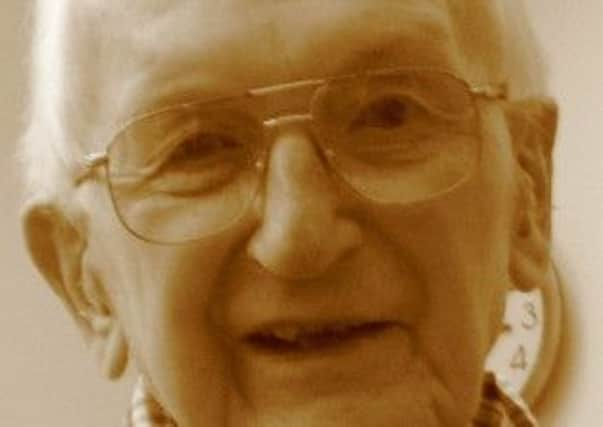Obituary, Martin Orde, civil servant


Martin Orde was born in London on 17 May, 1922, the third of four children. His father was Sir Charles Orde KCMG, of Nunnykirk, Northumberland, and the Foreign Office. His mother, Frances Davidson, was a pianist.
He was a sickly child and at the age of 6, having been diagnosed as “tubercular”, he was sent to a school for English children at Chateau d’Oex in Switzerland. Though he never developed TB, he suffered from most other childhood illnesses and remained in Switzerland until, at his father’s insistence, he was sent to Leighton Park school at the age of 16.
Advertisement
Hide AdAdvertisement
Hide AdFrom Leighton Park, Martin went to Christ Church, Oxford, to read Politics, Philosophy and Economics. After taking a shortened War Degree he was called up, but was given a category C fitness rating (Home service only). This could have meant that he spent the war in a desk job. However, he discovered that he could apply to the Royal Artillery, which would accept category C men to serve in Britain in anti-aircraft units; and that, once accepted, he could apply to serve abroad without his health record being referred to again.
In this way he saw active service in Italy, where he was mentioned in despatches. He was also fortunate enough to hear Gigli singing in Tosca, on a short leave in Rome, and to see the 1944 eruption of Vesuvius. After the war, while waiting to be demobilised, he learned to ride under a Sergeant Instructor. (“If you touch that bloody saddle again, I’ll break your bloody arm, Sir!”)
After demobilisation Martin joined the Colonial Service, and in due course was sent to Northern Nigeria. He had inherited his mother’s love of the piano, and was delighted to acquire one from a departing officer, together with a special crate built to allow it to withstand travelling on pot-holed, unmade roads. He taught himself to tune the instrument and found it a great solace. However, when a school in his district held a piano competition he was the obvious choice for a judge, with the result that he never again had any desire to listen to Für Elise.
In 1952, while on leave in Northumberland, Martin met and married Jane McCracken, daughter of Lt-Col Angus McCracken and the playwright Esther McCracken. Jane took in her stride the climate, the language difficulties, the strange food, travelling round a huge district with small children in tow, and the various broken bones suffered by her husband while playing polo. They continued to live in Nigeria until 1959, when they moved to The Gambia. Here they lived in a house next door to Government House in Bathurst (now Banjul), where the children’s bedtime was heralded by the sound of the bugler playing when the flag was lowered at 6.30pm. In 1963, Martin was awarded the OBE.
In 1964 The Gambia, the last British colony in West Africa, was close to independence. The Ordes and their four children sailed for England for the last time. Martin found that a man who had held a senior position in government (even of a tiny country) was considered over-qualified for many jobs. Eventually he found a post in the Scottish Office in Edinburgh.
Though the work was far less interesting, the move had compensations. Concerts, operas, choirs to sing in, day schools for the children and the Edinburgh Festival were now within reach.
In their house in South Queensferry, just outside Edinburgh, Martin had space for his mother’s beloved Bechstein grand piano.
He sang for many years in the Edinburgh Bach Choir, and later in the Edinburgh Royal Choral Union. He particularly enjoyed appearing in the chorus of a production of Lyndsay’s Ane Satyre of the Thrie Estaitis at the Edinburgh Festival.
Advertisement
Hide AdAdvertisement
Hide AdIn 1980 the former Southern Rhodesia, soon to be Zimbabwe, held its first general election open to all voters. Martin, with other former colonial officers, was recruited by the British Government to help oversee the elections. He managed to avoid taking part in counting the votes, and so was able to take a few days to see the country after the voting was over.
Under strict Scottish Office rules at the time, Martin was required to retire at the age of 60. He was invited to join the board of Queen Margaret College (now Queen Margaret University), and soon became chairman. He also volunteered for the Citizen’s Advice Bureau. However, most of the extra time he now had was spent on another great interest – sailing.
Martin first took up sailing in The Gambia. In Scotland he owned a series of boats, gradually increasing in size from a dinghy to a boat in which he could sail around the west of Scotland for weeks at a time.
His voyages were recorded in meticulously kept log books. Once, he and a friend were sailing down the Firth of Clyde when the boat suffered a tremendous shock, and a huge marine creature rose briefly from the depths and sank again. They rushed to the nearest port to check for damage, and said to the first person they saw on the quay: “I think we’ve just hit a whale.”
He calmly replied: “That would be a basking shark. You get a lot of them in the Clyde this time of year.” Martin marked the spot on his chart “Here be sharks”.
After Jane’s death in 2000, Martin moved to Newcastle to be near his eldest daughter. He immediately joined the Newcastle Bach Choir, in which he continued until increasing deafness made it impossible for him to hear the conductor’s instructions.
Though frail in his later years, he was still able to enjoy going to concerts, listening to Radio 3, and receiving visits from his children and grandchildren.
He is survived by his two sons and two daughters, and by seven grandchildren.
CHARLOTTE FARMER